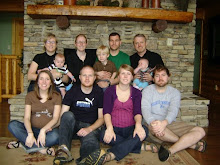Simple Church or 7-Day-a-Week Church?
 Just finished re-reading Simple Church by Rainer and Geiger. (Broadman & Holman Publishers, A Division of Lifeway, 2006)
Just finished re-reading Simple Church by Rainer and Geiger. (Broadman & Holman Publishers, A Division of Lifeway, 2006)The sub title? Returning to God's Process for Making Disciples.
"Simple Church calls Christians to make a clear return to the simple gospel-sharing methods of Jesus. No elaborate, multi-level outreach strategies required."
"Based on new case studies of four hundred American churches..."
The premise of the book is precisely focused on a major need of most churches - so many programs vying for volunteers, promotion and money - that many of those programs fail to achieve their desired results.
The answer, according to the authors, is to find "Clarity - Movement - Alignment - Focus," in that order.
Intuitively I was drawn to the book's premise and was sold on it before I even read the examples of churches given as proof texts.
You'll have to read the book to get their arguments but they basically hover around three facts:
1) Jesus used a simple model.
2) Our culture needs simple due to its complexities.
3) Too much going on in the church strains the resources of the people - time, money, talents, etc.
I think if most churches would major on solid weekend worship gatherings, small groups and community service/outreach, doing those things right would be enough to occupy an entire church family and its resources.
Years ago a popular book on church programs was Lyle E. Schaller's "Seven-Day-a-Week Church." (Abingdon Press, 1992) Here are a few things he said...
"The Sunday morning church has been succeeded by the seven-day-a-week parish. To be more specific, the number of Protestant churchgoers who are satisfied with the Sunday morning church has been decreasing. Concurrently the number of people seeking the quality of ministry and the range of choices offered by the full-service program church with a seven-day-a-week schedule has been increasing at a remarkably rapid pace. ...grow younger and larger by becoming a full-service church." (Page 43)
"The vast majority of new members born before 1930 reply that their first visit was on a Sunday morning. The majority of those born after 1950 look back to a weekday or weeknight even as the occasion for their first visit. (A long list of events follows) In simple terms, the principal entry point for prospective future members in large churches has moved from Sunday morning to seven mornings, seven afternoons, and seven evenings every week." (Page 44)
I won't critique Schaller extensively. He makes some good points about how Sunday morning is not the only time for people to become acquainted with the body of Christ. But I think a lot of people got burnt and burnt-out by his model.
I don't mean to sound any more spiritually haughty than Rainer and Geiger did by their sub-title, but I'm going to "return to God's process for making disciples."

 Been a couple of weeks since I've posted. Took a little vacation from blogging.
Been a couple of weeks since I've posted. Took a little vacation from blogging.
 The weather was so cool that the ladies were wearing sweaters!
The weather was so cool that the ladies were wearing sweaters!

